Week Two: Indigenous Programming
Kalila Shapiro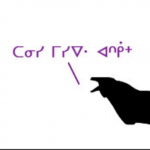
Kalila Shapiro discusses the problematic supremacy of English in global programming, and explores ways that Indigenous programming languages, including Jon Corbett’s Cree#, have sought to break down this “cultural coding barrier”
Week One: Introduction to Critical Code Studies
Meredith Finkelstein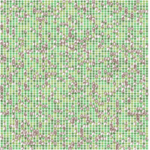
Meredith Finkelstein surveys key methodological aims of CCS, and considers the ways attending to code can enrich understanding of digital works, looking specifically at digital artist and programmer Eugenio Tisselli’s code for Amazon.html
TL;DR: Lessons from CCSWG 2020
Mark C. Marino, Jeremy Douglass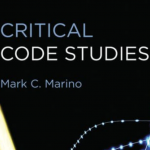
Mark C. Marino and Jeremy Douglass discuss the field of Critical Code Studies (CCS) and introduce three reports about the discussions of the CCS Working Group 2020.
Introduction to Critical Code Studies Working Group
Mark C. Marino, Jeremy Douglass
Jeremy Douglass and Mark C. Marino reflect on the activities of the Critical Code Studies (CCS) Working Group 2020.
Gastropoetics
Davin Heckman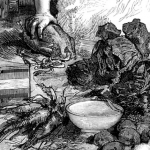
While Gastropoetics is a marginal practice, these culinary experiments explore the relational dynamics of cooking, hospitality, and eating as persistent humanistic practices, even as such practices are increasingly mediated by "food selfies" and other emerging, performative taste practices. Key to understanding the appeal of gastropoetics is the ad hoc nature of human production and consumption (see de Certeau's "everyday life") performed under the constraints of the generated menu, of the platform, and of the mnemotechnical system itself.
Learning Management Platforms: Notes on Teaching “Taroko Gorge” in a Pandemic
Dani Spinosa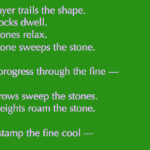
Dani Spinosa reflects on the relocation of e-Lit scholarship and pedagogy "in the remote classroom for the precariat writ large."
On Reading and Being Read in the Pandemic: Software, Interface, and The Endless Doomscroller
Ben Grosser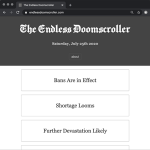
As a follow up to the series of interviews with Ben Grosser in February and March 2021 (published later that year in ebr), we include here a more settled, post-pandemic set of reflections. In the interviews, Grosser noted how "the realities of the pandemic necessitated back then," and maybe still does, "a degree of vigilance about new information": is there anything new that we need to know? The flood of information, however, has been less about knowing and acting on that knowledge than it is about keeping us engaged, and returning us daily, hourly, and minute by minute to our digital doomscrolls. For this newly produced populace that is largely stuck online, Grosser here discusses a net art / e-lit project of his own, an alternative software interface called The Endless Doomscroller.
Executable Landscapes: Speculative Platforms and Environmental E-Literature
Richard A. Carter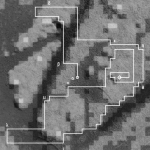
In this article, Richard Carter outlines an ongoing critical and creative engagement in electronic literature, digital sensing, and ecological concerns. Like many who are now publishing critical and creative works together (particularly in The Digital Review), Carter situates his practices in a set of entangled disciplines, and then discusses his developing project Landform.
Language |H|as a Virus: cyberliterary inf(l)ections in pandemic times
Diogo Marques, Ana Gago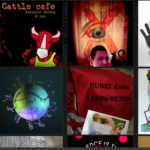
While presenting a series of four selected E-Lit artworks, Marques and Gago demonstrate how our recent pandemic will affect new media art, similarly to the ways in which the Athens Plague affected the writing (and reception) of Greek tragedies. And the same goes for Cinema and Aids, smallpox and illustration, photography and the third bubonic plague, usw.
“AN INTERNET BARD AT LAST!!!”: The Precarious Power of Alt-Lit Poet Steve Roggenbuck
Leah Henrickson
A critical encounter with one of alt-lit (alternative literature) movement’s most renowned contributors, whose moment (like many in this scene) has passed. Citing Christian Howard, Leah Henrickson advances the argument that “[w]e’re at a turning point in literary studies, and we need to confront how the changes in mode are affecting – and are affected by – the alternative networks of circulation within these digital spaces.”
Electronic literature as a method and as a disseminative tool for environmental calamity through a case study of digital poetry ‘Lost water! Remains Scape?’
Shanmugapriya T, Deborah Sutton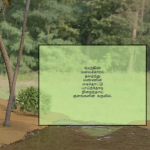
Reflections on an emerging digital poetry whose primary theme is ecological loss, and personal reminiscence.
Digital Narrative and Experience of Time
Erika Fülöp, Serge Bouchardon
Through the examples of three types of digital stories, including an interactive narrative for the smartphone based on notifications, a web narrative based on a real time data flow, and the widely used social media feature of stories, Bouchardon and Fülöp explore the relationship between the digital, temporality, and narrative. They ask, "what new narrative forms, or even new concepts of narrative do these new temporal experiences provided by digital technology offer to us?"
The Art Object in a Post-Digital World: Some Artistic Tendencies in the Use of Instagram
María Goicoechea de Jorge
While defining the art object in a post-digital world, Maria Goichoechea de Jorge observes in media artists a nostalgia for an analogue craftsmanship; a rebellion against machinic perfection; and a resistance to forms of human creativity that propel us into an ever more profound symbiosis with our technological lifeworld.
Repetition and Defamiliarization in AI Dungeon and Project December
Alex Mitchell
Alex Mitchell (leader of the Narrative and Play Research Group at the National University of Singapore) shows how, while generative text adventure AI Dungeon allows players to uncritically interact with the AI system as they co-create a story, Project December instead primes the player for reflection and interpretation. Unlike most digital games, which emphasize immersion, this brings forward the problematic nature of their technology platforms: foregrounding rather than normalizing the strangeness of the experience, or even generating a kind of "spooky magic," as Project December creator Jason Rohrer puts it.
Indian Solo Electronic Writing and its Modernist Print Anxiety
Samya Brata Roy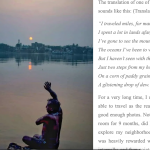
Building on the work of Souvik Mukherjee (2017), T. Shanmugapriya and Nirmala Menon (2018, 2019), Samya Brata Roy identifies emergent elements of a multimodal E-Lit tradition in India.